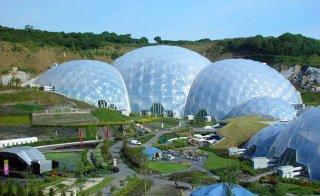There are different classes of good-value PE-based films, depending on the envisaged purpose and length of use, as well as co-extruded films with functionalised layers and high-quality PVC films. If a particularly long lifespan is an important factor (lifespans of over 25 years are possible), then glass and EFTE film claddings (e.g. F-Clean® from AGC) are practically the only two options open to you.
The provisions of construction law and plants typical demands (e.g. UV) require the use of special types of glass, which, in turn, require an expensive frame due to their weight. EFTE films offer a number of benefits, which make replacing glass and high-quality PE composite films worthwhile:
- Optimum use of solar energy (85-90% transparency)
Tearproof, elastic and extremely resistant to hail - Provides great heat insulation when two or three layers are used ( < 3,5 W/m² for a greenhouse )
- Creates savings when two or three layers are used, by reducing power consumption by over 30%
- Can block IR radiation and provides shade where special equipment is used
- Very light, meaning it is also suitable for retractable roofs and other large roof ventilation systems.
- Can be used as a film curtain, making it possible to completely open up the greenhouse.
- When used as a covering material, EPTE film falls into the B1 building material class (fire-resistant).
- Also suitable for greenhouse structures that use a combination of glass and film to save energy (CO2 optimisation).
- Extremely resistant to chemicals, cannot be damaged through contact with chemical sprays.
- No undesired longitudinal growth, chlorophyll is similar to that in plants grown on open land.
- Very good resistance even against sand and dirt for projects in dessert-like environments
- No expensive ESG glass for overhead glazing necessary
Regardless of the envisaged use of a film greenhouse (horticultural buildings) with ETFE covering, whether it’s for cultivating vegetables and ornamental plants, producing seedlings or for toughening up of plants, the film membrane can still get repeatedly damaged by accident. Strong gusts of wind and the abrasion of load-bearing parts can also cause damage to the film. Given that EFTE is extremely resistant to contamination (given that it is an anti-adhesive surface) it is difficult to repair with standard tape. The surface, which has properties similar to Teflon, prevents good adhesion.
That is why, for many years, CMC Klebetechnik has been making a type of tape that is particularly effective in repairing ETFE film greenhouses/horticultural buildings. The tape consists of a 100µm strong EFTE film from Nowofol. This tape is extremely resistant to chemicals and ageing and adheres really well to almost all surfaces, as well as being resistant to infiltration (by rain, dew or condensation). You can also use the CMC 77700 / CMC 77701 EFTE tape for sticking on chafe marks that pose a particular risk, helping to maintain the durability of the film covering.The EFTE tape can also be used to repair membrane structures (double-layered covers with a film structure that is stabilised using compressed air), as it can cope with the shear stress placed on it during inflation.
This tape from CMC Klebetechnik allows high-quality film greenhouses to be maintained for many years, with repairs being almost invisible. This makes perfect sense when you take the costs of EFTE film into account.
Adhesive tape rolls are available
from 5 mm to 500 mm in 50 m length.
Other length is possible (2 m – 200 m).
Shape of die cut or kiss-cut parts are flexible and can defined by the customer.(
For five decades CMC has been coating foil-like materials with adhesive and functional coatings. 150 employees are refining premium films on two coating facilities and over 30 downstream facilities (formatting machines, die-cutting machines, rotative cutting machines). These insulation materials are mainly used in electrical engineering but also across a broad range of industries. The company focuses on the implementation of customer-specific developments as well as professional advice. For more information please visit : www.cmc.de or call +49 6233 872 356 or email friederici@cmc.de.
CMC Klebetechnik GmbH
Rudolf-Diesel-Straße 4
67227 Frankenthal
Telefon: +49 (6233) 872-300
Telefax: +49 (6233) 872-390
https://www.cmc.de
Prokurist
Telefon: +49 (6233) 872-356
Fax: +49 (6233) 872-390
E-Mail: friederici@cmc.de
![]()
